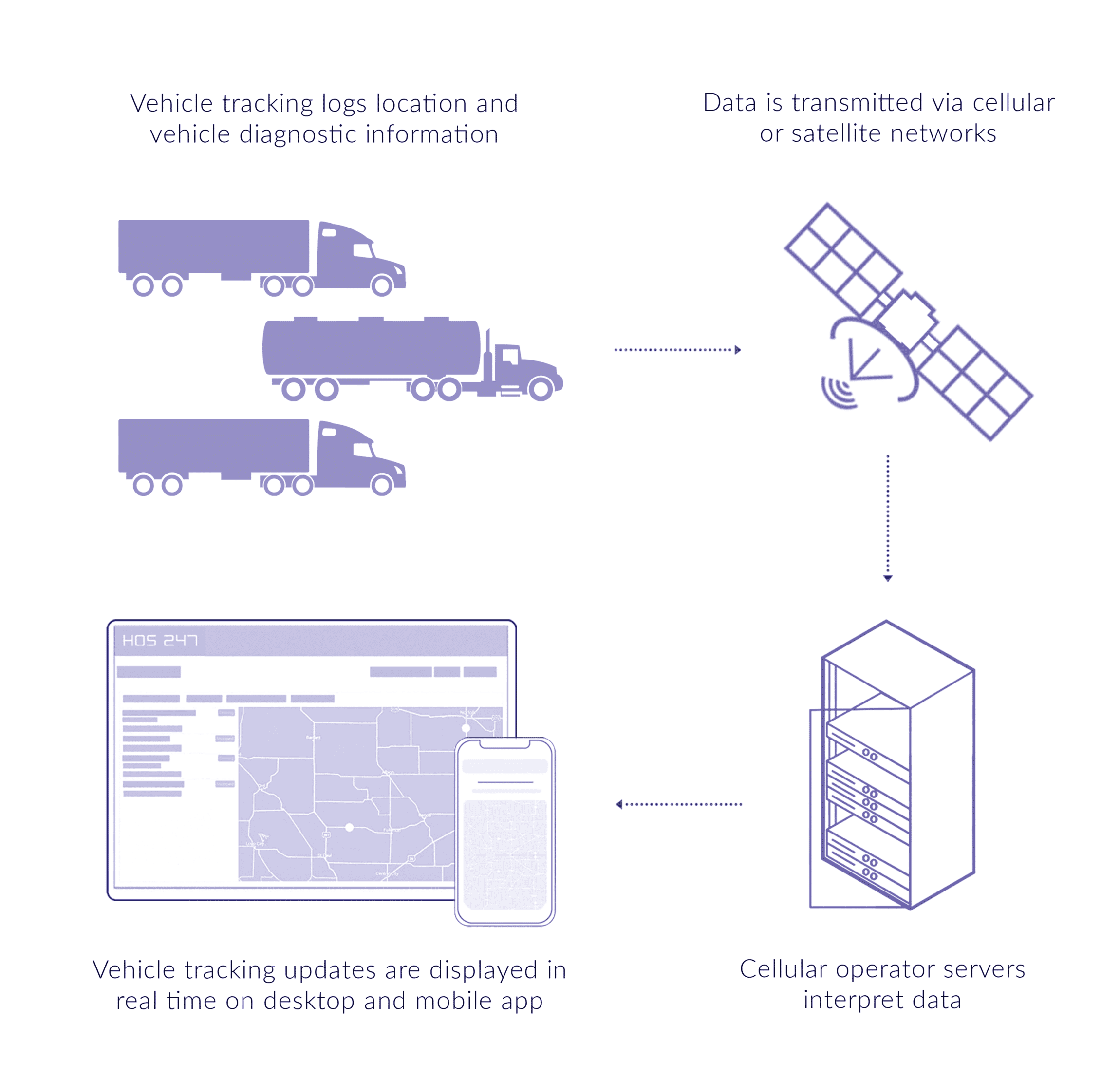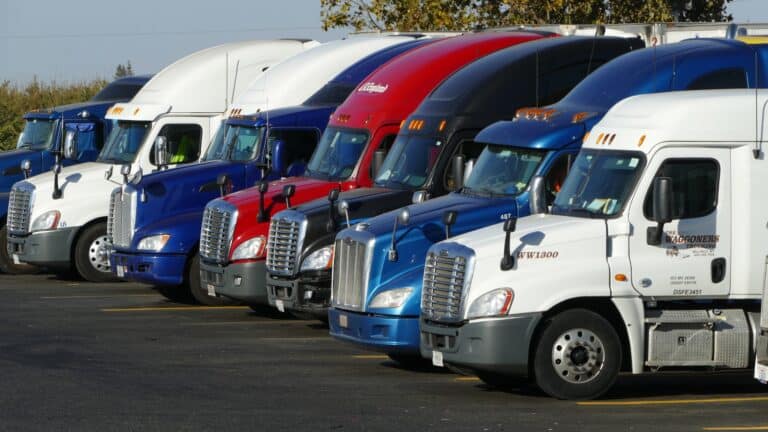In today’s fast-paced business world, managing a commercial fleet can be challenging, but it doesn’t have to be. With the help of fleet management systems, carriers can enjoy various benefits, such as reducing fuel costs, enhancing driver safety, providing better customer service, and gaining greater control over their fleet.
These modern systems integrate advanced technologies to provide unprecedented operational visibility and control, enabling fleet managers to make data-driven decisions and optimize resources effectively. They help businesses address key challenges including regulatory compliance, vehicle maintenance, and operational efficiency while maintaining competitive advantage in the market. In this article, we will explore how commercial vehicle fleet management can help you achieve this, and we will present an all-in-one system to streamline operations and increase profitability.
Do you have any questions? Talk to ELD Advisor: 650-405-3372 or Request Callback
Revolutionize Your Trucking Business HOS247’s All-in-One Fleet Management Solutions
HOS247 offers a complete end-to-end solution that covers crucial aspects of fleet management, from vehicle tracking and electronic logging to vehicle maintenance and idle tracking. Our all-in-one fleet management system helps businesses simplify and streamline management, gaining greater control over their fleet and helping improve profitability. Let’s take a closer look at HOS247’s system and the benefits it provides to carriers:
- ELD. HOS247’s electronic logging device is designed to help businesses comply with FMCSA regulations and minimize violations. We are committed to providing excellent assistance through our top-rated customer service. Our hardware is high quality and the app has a user-friendly interface to enable drivers to manage their logs easily, avoiding fines andpenalties and maintaining low CSA scores.
- GPS fleet tracking. With our real-time GPS fleet tracking, fleet managers can accurately monitor the location of vehicles, plan dispatch effectively, and increase productivity. Additionally, GPS fleet tracking can help prevent theft by enabling managers to quickly identify the location of assets, even when they are not in use.
- IFTA state mileage calculations. This HOS247’s feature streamlines the administrative paperwork burden associated with IFTA tax reporting, reducing the risk of human error and potential audits.
- Vehicle maintenance. This built-in management system helps carriers provide vehicles the necessary care they need to operate at peak performance by automatically scheduling maintenance events based on mileage and hours of usage. The service tracks a wide range of maintenance tasks, including oil changes, tire rotations, and warranty expirations, and keeps a record of all past service history. This allows fleet managers to stay on top of maintenance needs, minimizing the risk of unexpected breakdowns and prolonging the life of their vehicles.
- Fault code detection. Another powerful tool for increasing a vehicle’s longevity and avoiding costly repairs, this system monitors vehicle diagnostics, quickly identifying malfunctions and generating a specific trouble code that corresponds to the fault found. The code is then transmitted as an alert to the vehicle’s instrument panel, warning the driver and alerting management or the maintenance department, allowing for prompt attention and repair.
- Automated idle tracking. This feature offers a useful solution to reduce fuel costs and minimizing wastage. Fleet managers can easily identify and address idling and other problematic behaviors in their drivers, such as speeding and rapid acceleration, promoting more efficient and sustainable driving habits. Automated idle tracking helps businesses save on fuel expenses while reducing their carbon footprint.
By utilizing HOS247’s comprehensive all-in-one commercial vehicle fleet management solution, businesses can streamline their operations, reduce costs, and increase overall productivity, while remaining compliant with the ELD mandate.

Advanced Technology in Commercial Fleet Operations
Modern fleet management has evolved beyond basic tracking and logging. Today’s systems leverage cutting-edge technology to provide unprecedented operational insights and control. Here’s how advanced technology is transforming fleet operations:
- AI-powered analytics. Artificial intelligence processes vast amounts of fleet data to identify patterns and predict potential issues before they occur. This technology helps optimize routes, reduce fuel consumption, and prevent vehicle breakdowns.
- Predictive maintenance systems. Advanced algorithms analyze vehicle performance data to forecast maintenance needs. This proactive approach helps prevent costly breakdowns and extends vehicle life spans.
- Real-time decision support. Modern fleet management systems provide instant alerts and recommendations based on current conditions. Fleet managers can make informed decisions about routing, maintenance, and driver assignments.
- Mobile integration. Today’s solutions offer comprehensive mobile access through secure apps. Drivers and managers can access critical information and submit required documentation from anywhere.
- Automated reporting. Advanced systems generate detailed reports on fuel usage, driver behavior, and vehicle performance automatically. This automation saves time and reduces human error in compliance reporting.
This technological transformation in fleet management is driving significant operational improvements. Industry research shows that fleet leaders increasingly recognize AI’s critical role in gaining operational visibility and reducing costs. The integration of these advanced technologies is helping fleet operators transition from reactive to proactive management approaches, with leaders across sectors reporting positive impacts on their operations.
Safety and Compliance in Fleet Management
Safety and regulatory compliance are crucial in commercial fleet operations. Modern fleet management systems provide tools and features specifically designed to enhance safety and ensure compliance:
- Driver safety monitoring. Advanced systems track driver behavior patterns including speed, harsh braking, and rapid acceleration. This monitoring helps identify areas for coaching and improvement.
- Risk management tools. Comprehensive risk assessment features help identify potential safety issues before they lead to accidents. Fleet managers can use this data to develop targeted safety programs.
- Compliance automation. Built-in compliance tools automatically track hours of service, maintenance schedules, and required documentation. This automation helps prevent violations and simplifies audits.
- Training integration. Modern systems include driver training modules and performance tracking. These features help maintain high safety standards across the fleet.
- Insurance optimization. Advanced safety features and detailed operational data can help reduce insurance premiums. Many insurance providers offer discounts for fleets using comprehensive management systems.
The impact of these safety and compliance tools extends beyond regulatory requirements. Fleet leaders widely agree that AI-enabled monitoring systems make roads safer and play a crucial role in preventing accidents and coaching drivers. This technology-driven approach to safety has become particularly valuable as worker safety issues remain a significant business concern across the industry.
About the ELD Mandate
The ELD mandate requires CMV drivers who keep HOS records to use electronic logging devices for more accurate, tamper-proof information about their driving hours. Operators must use devices that are self-certified by the manufacturer and registered with the FMCSA.
In addition to mandating elog usage, the rule also outlines specific requirements for supporting documents that drivers and carriers must keep to verify the accuracy of drivers’ records. These documents include a user manual for drivers, instructions for data transfer, and blank RODS graph-grids.
As noncompliance with the mandate can result in costly fines and penalties, carriers should have a thorough understanding of who is required to use electronic logging devices. The FMCSA has established clear guidelines for CMV operators subject to the rule.

Who Needs ELDs According to the FMCSA?
The FMCSA requires compliance with the ELD mandate for most motor carriers and drivers who maintain records of duty status as per 49 CFR Part 395.8(a). This includes drivers of commercial buses and trucks, as well as those domiciled in Canada and Mexico.
However, the Federal Motor Carrier Safety Administration has outlined a few limited exemptions from the rule, which allow certain drivers to continue using traditional paper logs or time cards instead of ELDs. These include:
- Drivers who operate under the short-haul exception.
- Drivers who use paper RODS for no more than 8 days within every 30-day period.
- Drivers involved in drive-away-tow-away operations, where the vehicle being driven is the commodity being delivered.
- Drivers of vehicles with engines manufactured before 2000.
If none of these conditions apply to your situation as a CMV motor carrier, it is highly likely that your drivers are required to use ELDs. We have previously highlighted the benefits of HOS247’s all-in-one management solution, let’s now discuss how our customer care policies have enabled HOS247 to become a leading provider of commercial vehicle fleet management and ELD solutions in the market.
HOS247 Customer Care Policies
At HOS247, we take pride in our commitment to our customers. Our aim is to provide a high-quality service that enables our clients to focus on growing their businesses. What are the characteristics that make us stand out from other providers?
- Top-rated customer service. The HOS247 multilingual technical support team is available from Monday to Friday and can assist with any troubleshooting, compliance questions, or everyday device usage. With fluency in English, Russian, and Spanish among our team members, language barriers do not pose obstacles to our ability to provide excellent service.
- Callback policy. At HOS247, we understand the importance of responsive and reliable customer service, which is why we have implemented a callback policy. If a call drops, our managers will promptly reach out to our customers to address any concerns they may have, providing immediate assistance.
- Flexible subscription plans. In addition to the callback policy, we offer a no-contract subscription system that allows truckers to choose a plan that works for them. Our subscriptions can be paid monthly or yearly, and they can be easily scaled up or down as needed without any long-term commitments.
- One-year warranty. We stand behind the quality of our products and services, and as a testament to this, we offer a one-year hardware replacement warranty on all our devices. In the unlikely event that you encounter any issues with our hardware within the first year, we will replace it for free.
- Effortless installation. Designed for easy installation, our system provides a hassle-free experience for customers.
- Two-week trial. Our commitment to providing reliable and cost-effective solutions is further reinforced by our two-week trial and demo offer. This allows you to fully test our products and services, ensuring that you are completely satisfied with our solutions.
- Intuitive fleet manager online portal. Our fleet management portal can be accessed from any internet browser, providing real-time data on your fleet’s location and performance. With a reliable internet connection, fleet managers can effortlessly utilize HOS247’s commercial fleet management software using any web-capable device to stay connected to their fleet and make informed decisions on the go.
These benefits complement HOS247’s features while preparing our clients for a competitive industry. Our platform continues to provide quality services to truckers with a core focus on reliability and ease of use.

Conclusion
The future of commercial fleet management lies at the intersection of technology, safety, and operational efficiency. As the industry faces challenges including rising costs, labor shortages, and increasing regulatory requirements, comprehensive fleet management solutions have become essential for maintaining competitive advantage.
Modern fleet management systems address these challenges by providing real-time visibility, automated compliance monitoring, and data-driven insights. Research indicates that fleet leaders consistently report improved decision-making capabilities with data-driven solutions, while most agree that implementing unified, end-to-end systems streamlines their operations.
The adoption of advanced technologies like AI and predictive analytics is transforming fleet operations. These tools help prevent accidents, maintain compliance, optimize routes, reduce fuel consumption, and improve vehicle maintenance scheduling. With features like automated IFTA calculations, real-time GPS fleet tracking, and comprehensive maintenance management, today’s fleet management solutions help businesses reduce operational costs while improving safety and service quality.
For fleet operators looking to remain competitive in an evolving industry landscape, investing in a robust fleet management system is no longer optional — it’s a strategic necessity. These solutions provide the tools needed to navigate current challenges while preparing for future opportunities in the physical economy.

I’ve co-founded, built and managed several transportation-related businesses. Now, I’m a founder and CEO of HOS247 – an AI Transportation Platform for trucking companies, freight brokers and other logistics operations. We are transitioning old-style operations to technology-advanced logistics entities and help them to grow their businesses. ELDs (electronic logging devices), fleet tracking and management 2.0 combined with AI-powered dispatch tools.












In the commercial trucking industry, accurate record-keeping of driving hours is not just a regulatory requirement — it’s a cornerstone of safety and efficiency. The transition from paper logs to electronic logging devices (ELDs) has revolutionized how drivers and carriers

Your ELD should have everything needed to keep your trucking business in compliance with federal regulations and to make your job easier. However, there are hundreds of electronic logbook options, and some of them can be pretty frustrating to manage.

The Logbook App for iPhone to Rely On Electronic logging devices are critical for drivers and carriers that operate under FMCSA hours of service rules. The challenge is finding the right ELD when there are so many on the market.